 Petzlover
Petzlover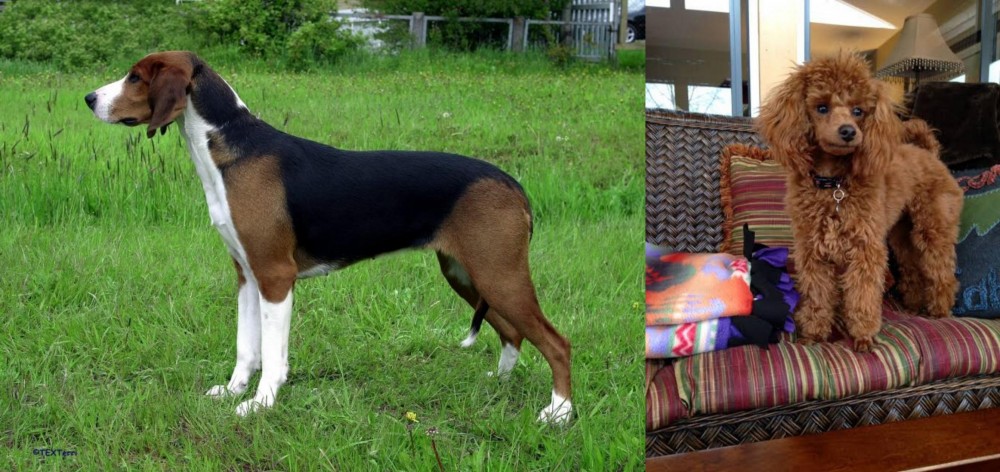 Finnish Hound is originated from Finland but Miniature Poodle is originated from Germany. Finnish Hound may grow 24 cm / 10 inches higher than Miniature Poodle. Finnish Hound may weigh 17 kg / 38 pounds more than Miniature Poodle. Finnish Hound may live 4 years less than Miniature Poodle. Both Finnish Hound and Miniature Poodle has almost same litter size. Finnish Hound requires Low Maintenance. But Miniature Poodle requires Moderate Maintenance
Finnish Hound is originated from Finland but Miniature Poodle is originated from Germany. Finnish Hound may grow 24 cm / 10 inches higher than Miniature Poodle. Finnish Hound may weigh 17 kg / 38 pounds more than Miniature Poodle. Finnish Hound may live 4 years less than Miniature Poodle. Both Finnish Hound and Miniature Poodle has almost same litter size. Finnish Hound requires Low Maintenance. But Miniature Poodle requires Moderate Maintenance
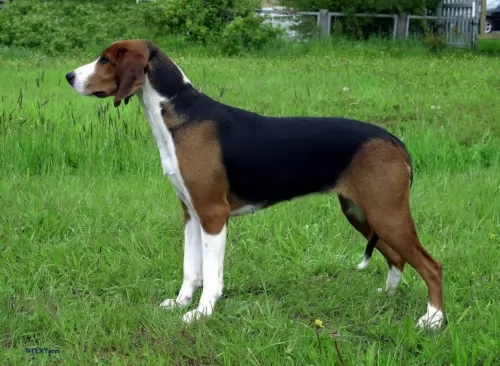 As one of Finland’s most popular dogs, the Finnish Hound isn’t particularly well known outside of Finnish borders. Known also as the Finsk Stovare, the Finnish Hound, known for its hunting skills, came about because of a breeding effort which started way back in the 1800s, mixing dogs such as different French, Swedish, and German hounds.
As one of Finland’s most popular dogs, the Finnish Hound isn’t particularly well known outside of Finnish borders. Known also as the Finsk Stovare, the Finnish Hound, known for its hunting skills, came about because of a breeding effort which started way back in the 1800s, mixing dogs such as different French, Swedish, and German hounds.
These hounds were used with the idea being to develop a dog that could do well in Finland’s terrain. The Finnish Hound is a great hunting dog but isn’t looked upon as an particularly awesome pet, although some pet owners would beg to differ.
 The Poodle is no stranger to the dog world and has been a familiar face in Western Europe for hundreds of years. Though they have lived in Europe for centuries, their origins are unsure, with some saying they hail from Germany and others say France.
The Poodle is no stranger to the dog world and has been a familiar face in Western Europe for hundreds of years. Though they have lived in Europe for centuries, their origins are unsure, with some saying they hail from Germany and others say France.
The Miniature Poodles have been used in both countries as gundogs for water birds.
They have always been admired for their intelligence, and Miniature Poodles are believed to have been bred from Standard Poodles. It is interesting to note the 3 official sizes of the Poodle are Toy, Miniature and Standard – all considered one breed and judged according to the same written standard, just with different size requirements.
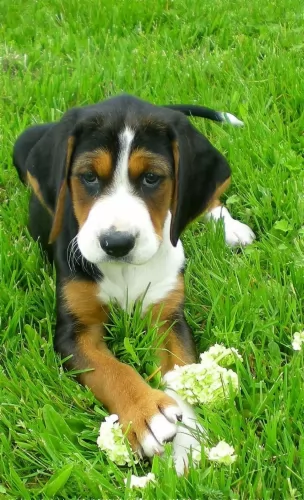 This is a medium sized dog who stands between 52 – 62cm in height and weighs in at 20 to 25kg. The Finnish Hound can have between 4 – 8 puppies.As a scent-hound, the Finnish Hound has a short, smooth double coat which is usually in a tri-color pattern of black, tan, and white.
This is a medium sized dog who stands between 52 – 62cm in height and weighs in at 20 to 25kg. The Finnish Hound can have between 4 – 8 puppies.As a scent-hound, the Finnish Hound has a short, smooth double coat which is usually in a tri-color pattern of black, tan, and white.
The attractive dog has an athletic, lean, muscular body full of energy and stamina. The eyes are brown and the dog has a peaceful expression. The medium length ears are floppy and the tail is long and carried low.
The Finnish Hound is friendly, calm and never aggressive. He is an intelligent dog nd will respond to the training and socialization he will require to turn him into an obedient, amicable pet, especially since he tends to be stubbon, independent and strong-willed. He isn’t recommended for small places in the city but will do better in the country with a fairy large piece of ground. The Finnish Hound is not recommended for apartment life. It is moderately active indoors and does best with at least an average-sized yard.
 With good care the lifespan of the Miniature Poodle is 14 – 16 years of age. This purebreed dog is small, standing at 28 – 38cm in height and weighing 7 – 8kg.
With good care the lifespan of the Miniature Poodle is 14 – 16 years of age. This purebreed dog is small, standing at 28 – 38cm in height and weighing 7 – 8kg.
The coat is typically curly, springy and dense. Colors of the coat can be cream, beige, silver, black, brown or apricot. They are low shedding dogs and are regarded as being hypoallergenic. The ears are floppy and the tail is usually docked to give the dog a nice, compact look.
The Miniature Poodle is intelligent and learns easily, so you won’t have any trouble with training him and having him socialized.
He is a lively dog and loves a game and a walk, loving as much time as possible spent with his human family. He gets on well with other pets in the home as well as with children who have been taught to be kind and gentle with animals.
They are not overly-friendly with strangers, and therefore make excellent watchdogs. They’re the kind of dogs who need both physical and mental stimulation though, and he won’t be content to be left and ignored – after all he counts himself as a member of your family! They make wonderful pets, being playful and energetic and loving water, always ready to swim with you.
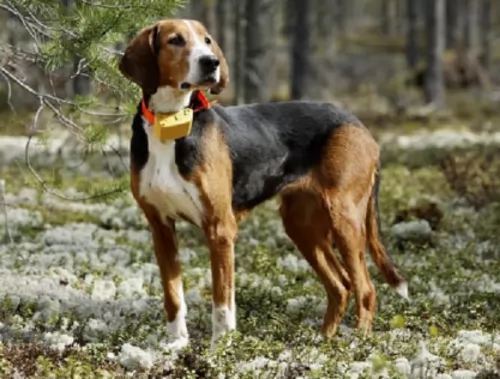 The Finnish Hound has always been a working dog and so he will require being well exercised.
The Finnish Hound has always been a working dog and so he will require being well exercised.
He makes a good pet with homes where there are other dogs as well as children. As a hunting or working dog, these days the Finnish Hound is also regarded as a companion animal, fitting into family life well, and turning out to be a loving, loyal pet.
 When you take a Miniature Poodle into your home and your heart, there are many wonderful positive aspects that come with him.
When you take a Miniature Poodle into your home and your heart, there are many wonderful positive aspects that come with him.
You won’t have any trouble training him as he is clever and bright. He is such a loving, loyal pet and he takes his job of guarding you seriously too.
Because they aren’t aggressive, they're easy to keep in the city or the countryside, so long as he receives plenty of love, companionship and exercise. Perhaps the only thing that may require a little bit of effort on your part is the fact that his coat will require quite a bit of upkeep to keep it looking good and healthy.
In exchange for looking after him, you’re going to benefit from having a wonderful canine friend and family pet in your life for many years.
 The Finnish Hound is looked upon as a generally healthy breed who can get to 12 years of age if looked after well. Good nutrition plays a huge role towards excellent health.
The Finnish Hound is looked upon as a generally healthy breed who can get to 12 years of age if looked after well. Good nutrition plays a huge role towards excellent health.
Check out common health ailments that can affect most dogs such as dental disease, obesity, hip dysplasia and a serious condition for which these dogs are particularly known – cerebellar ataxia. Lesions in the brain affect the dog’s coordination and sight. Get him to the vet as soon as you detect anything unusual with your pet.
 Dog’s thrive on good nutrition and exercise, and if your Miniature Poodle gets both of these combined with plenty of love, he can live to be up to 16 years of age and even older.
Dog’s thrive on good nutrition and exercise, and if your Miniature Poodle gets both of these combined with plenty of love, he can live to be up to 16 years of age and even older.
They are robust little dogs, but even so, they can get sick. Ear infections, joint diseases, obesity, dental disease and bloat are common dog diseases to look out for -
This is a life-threatening condition where your pet’s stomach fills with gas. The swollen stomach puts pressure on the diaphragm and the dog battles to breathe. The dog could also vomit, be drooling and lethargic.
The stomach can also twist putting the dog in shock. This bloating can occur with any dog breed and efforts can be made to avoid it by feeding the dog smaller more frequent meals as opposed to one larger meal which he gobbles up.
The dog shouldn’t exercise immediately after a meal either. You also want to avoid obesity at all costs.
When the mitral valve malfunctions, blood isn’t being pumped out of the heart to the rest of the body. If the mitral valve weakens or leaks it can lead to endocarditis.
Quite a number of dogs develop some form of heart disease during their lifetime, with a high percentage being due to mitral valve insufficiency, which is more common in smaller dogs.
Your dog may have a cough, be lethargic and lose weight. The first signs of a leaking mitral valve is a heart murmur. At first MVI doesn’t have obvious clinical signs, but with time the efficiency of the heart is reduced and congestive heart failure develops. Your veterinarian will evaluate your pet and suggest treatment.
A skin problem sounds fairly mild but it can cause havoc in your pet’s life, causing him to be constantly licking and scratching himself. The hair becomes dull and brittle, and breaking the skin from continuous scratching invites bacterial infection. These skin infections will require veterinary intervention.
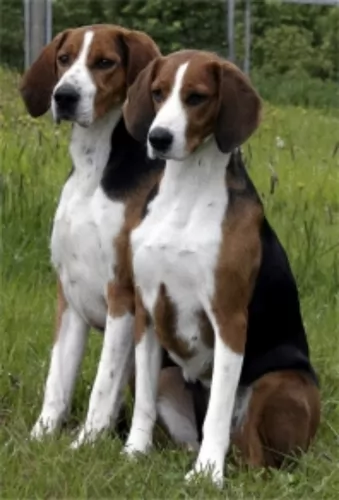 As a medium-sized dog breed, you want to make sure to feed your dog a high-quality commercial dog food – one that has been formulated with the right amount of vitamins and minerals for the type of dog he is.
As a medium-sized dog breed, you want to make sure to feed your dog a high-quality commercial dog food – one that has been formulated with the right amount of vitamins and minerals for the type of dog he is.
He is a high-energy hunting breed, so you wan to find a food that is appropriate to his needs. Home cooked brown rice, vegetables and chicken can be added into his kibble as a change and a treat from time to time as well as some raw meat occasionally. Make sure he always has access to fresh, cool water.
Physically active and mentally balanced and intelligent, the Finnish Hound will require both physical and mental stimulation to prevent him from becoming bored and frustrated.
As an average shedder, your pet's smooth, short-haired coat is easy to keep in tip top condition. All that is really required is to brush the coat down twice a week to keep it in peak condition.
Don’t neglect to check the inside of the dogs ears, as too much dirt and wax can cause nasty ear infections. Also, the teeth need to be brushed at least 2 or 3 times a week with special canine toothpaste and toothbrush. This will ward off tooth decay and lots of other problems within the body brought about by bad teeth.
 If you opt to keep your Miniature Poodle’s coat long, it will actually require regular brushing – every day in fact, if you want to avoid matting and tangling. Most people don’t like the work this involves and they have their Poodle’s hair cut short all over, then he only needs a brush once or twice a week. Your Miniature Poodle just loves the time you spend with him grooming him. It’s your time to feel for any unusual lumps and to also check for fleas and ticks. Some people take their pet to the doggy parlor to have the coat clipped.
If you opt to keep your Miniature Poodle’s coat long, it will actually require regular brushing – every day in fact, if you want to avoid matting and tangling. Most people don’t like the work this involves and they have their Poodle’s hair cut short all over, then he only needs a brush once or twice a week. Your Miniature Poodle just loves the time you spend with him grooming him. It’s your time to feel for any unusual lumps and to also check for fleas and ticks. Some people take their pet to the doggy parlor to have the coat clipped.
The dog’s nails should also be trimmed regularly, and their ears also need to be checked for wax buildup and debris which can lead to an ear infection.
Teeth need to be checked over too because dental disease won’t only lead to loss of teeth but it could be toxic for important body organs too.
Wipe around your pet’s eyes as tear stains can form under the eyes.
Make sure to feed your pet a top quality diet full of vitamins and minerals. Get to know the foods which can be toxic for your pet and cause stomach upsets. Dogs appreciate simplicity and consistency with their diets, and apart from dry kibble, home-made food such as boiled chicken, brown rice and vegetables can be excellent for your pet.